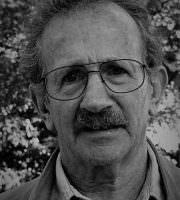by Philip Levine
“Eighteen years ago my cousin Arthur
died alone in a hotel
in Perugia,
and thus was my contact with the old world gone
as his ashes scattered
on the west wind.
I must visit him one more time so we can
resurrect the past,
the look of my mother
in a white dress, how she caught my father’s dark eyes
when he came, a stranger, to break
bread at her house.
We are two old men in the Hotel Violetta
late at night, each inventing
a life he can live with.
Always Arthur’s litany of regrets: how Federico
implored him, “Come to Santiago,”
how Arthur turned
it over in his mind and finally declined.
“Philip,” he says, “I could have
entered poetry
as a crushed cat, a lost boy, a needle
singing in the vague forehead
of a dying bull.”
Advertisements
Report this ad
Santiago de Cuba, Federico García Lorca,
the names themselves music.
Instead he came home
to grim, depressed Detroit to sell pianos
to the Grosse Pointe ladies,
to marry, to father
two stillborn children, only to lose his wife
before he was even fifty,
to die in ancient Perugia,
cold and aloof at 4 A.M., silent
on its promontory overlooking
the black Umbrian plain.
Someone is missing here: Arthur himself,
with his crooked teeth, the wide
welcoming grin,
the deep regard for everything alive.
What use going back unless
I can find Arthur
who is slipping away from me as
I write these words? His eyes,
were they hazel or gray?
Or did I merely catch the light flashing
from the thick lenses when
he turned to address me
in his odd, high voice cracked from use?
“Philip,” he would say, “let’s
pretend I am you and
you are me, together we are one man
in a hotel in Perugia.”
It is his voice I hear
until a tomcat cries out from the street,
a human cry, a child’s
seized by sudden pain,
and answered by a second human voice
unrolling in the dark.
The first light shades
the windows gray, the room takes shape:
two beds, a long blank mirror,
an absence of clutter.
The real dawn is grayer still. Then Arthur’s
laughter, his “yick-yick” of joy
in the new day.”
Last updated December 19, 2022




